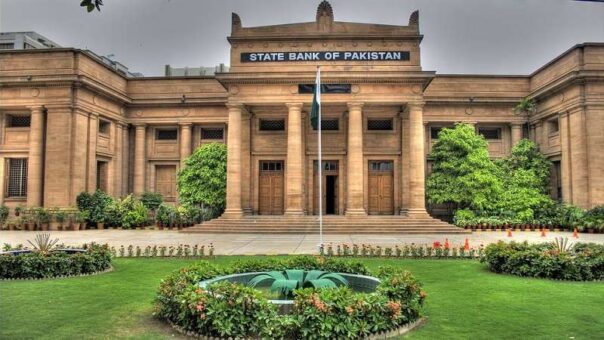Karachi, April 2, 2024 – Official data released on Tuesday revealed a startling surge in government bank borrowing for budgetary support, reaching a staggering Rs 4.69 trillion during the period spanning from July 1, 2023, to March 22, 2024.
The figures disclosed by the State Bank of Pakistan (SBP) depict a sharp rise of 127 percent compared to the same period in the previous fiscal year, where borrowing stood at Rs 2.07 trillion.
The method employed by the government to procure funds involves borrowing from commercial banks through auctions of treasury bills and Pakistan Investment Bonds (PIBs). The allure of lending to the government lies in the higher interest rates offered, a trend further encouraged by the SBP’s decision to maintain the benchmark interest rate at 22 percent, the highest in the region.
Despite retiring Rs 757 billion to the State Bank during the review period, total bank borrowing for budgetary support has soared to Rs 3.76 trillion. This exceeds the borrowing from the previous fiscal year, where the government borrowed Rs 3.72 trillion in total.
The repercussions of this aggressive borrowing spree and the consequent high interest rates have been felt across the financial landscape, with a notable impact on private sector borrowing. Private sector credit offtake plummeted to a mere Rs 35 billion during the July 1, 2023, to March 22, 2024 period, a stark contrast to the Rs 264 billion recorded during the same period in the previous fiscal year.
While the government seeks to address its fiscal needs through borrowing, the resultant high interest rates constrict the borrowing capacity of the private sector. This dwindling access to credit stifles investment and hampers economic growth, potentially exacerbating existing challenges.
With borrowing surpassing previous records, concerns regarding fiscal sustainability and debt servicing obligations loom large. The burden of servicing this mounting debt falls on taxpayers, diverting resources away from essential public services and investments in critical sectors.
Furthermore, the decline in private sector credit offtake signals a slowdown in economic activity, with businesses and entrepreneurs facing hurdles in accessing the capital needed for expansion and innovation. This poses a significant risk to job creation and overall economic prosperity.
As the government continues to navigate the challenges posed by burgeoning debt and a constrained private sector, a balanced approach is imperative. Measures aimed at fostering a conducive environment for private sector growth, alongside prudent fiscal management, are crucial to ensure sustainable economic development and mitigate risks to financial stability.
In the face of mounting debt and economic headwinds, policymakers must prioritize reforms that promote fiscal discipline, enhance revenue generation, and encourage investment. Only through concerted efforts can Pakistan chart a path towards long-term prosperity and resilience in the face of economic uncertainties.
